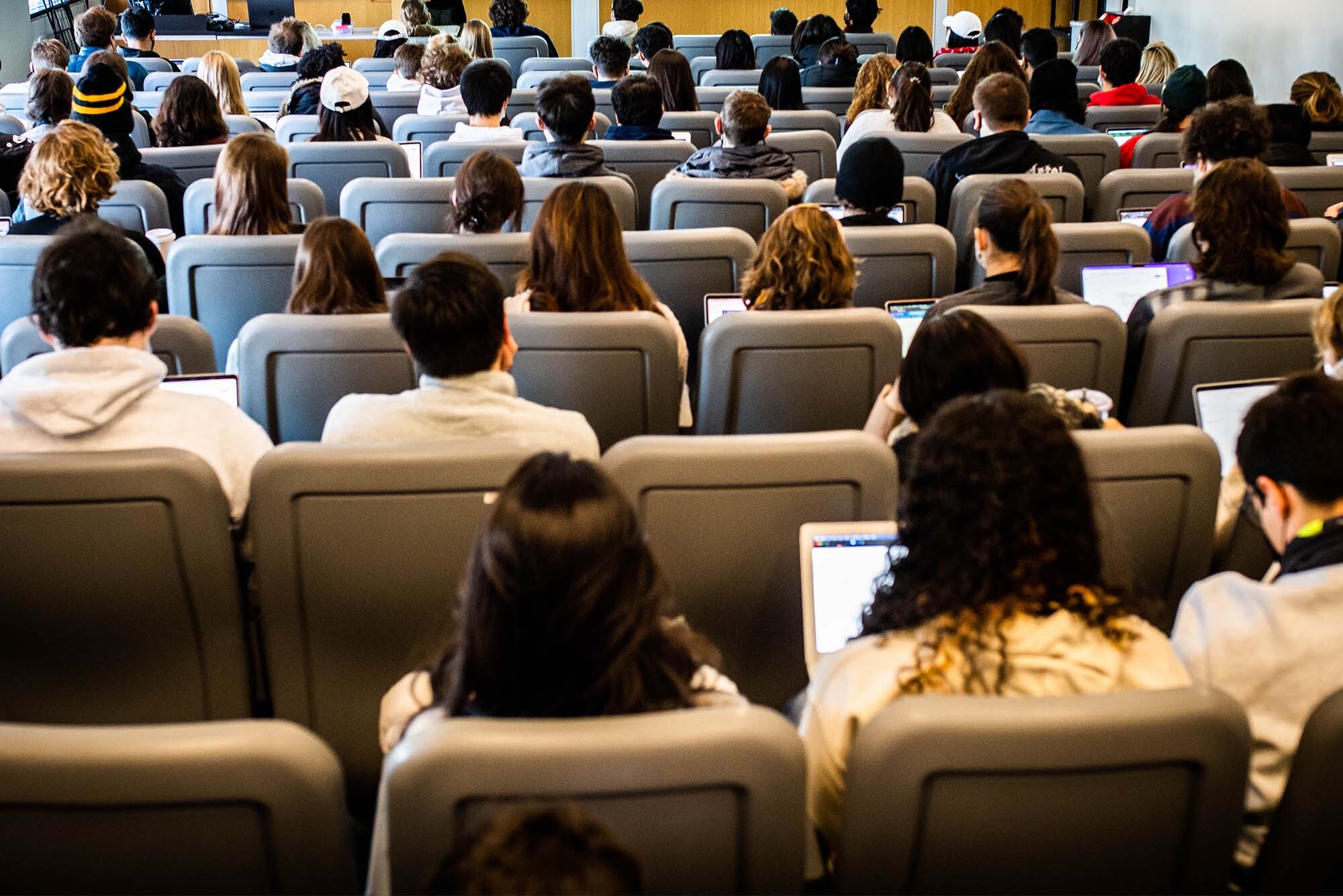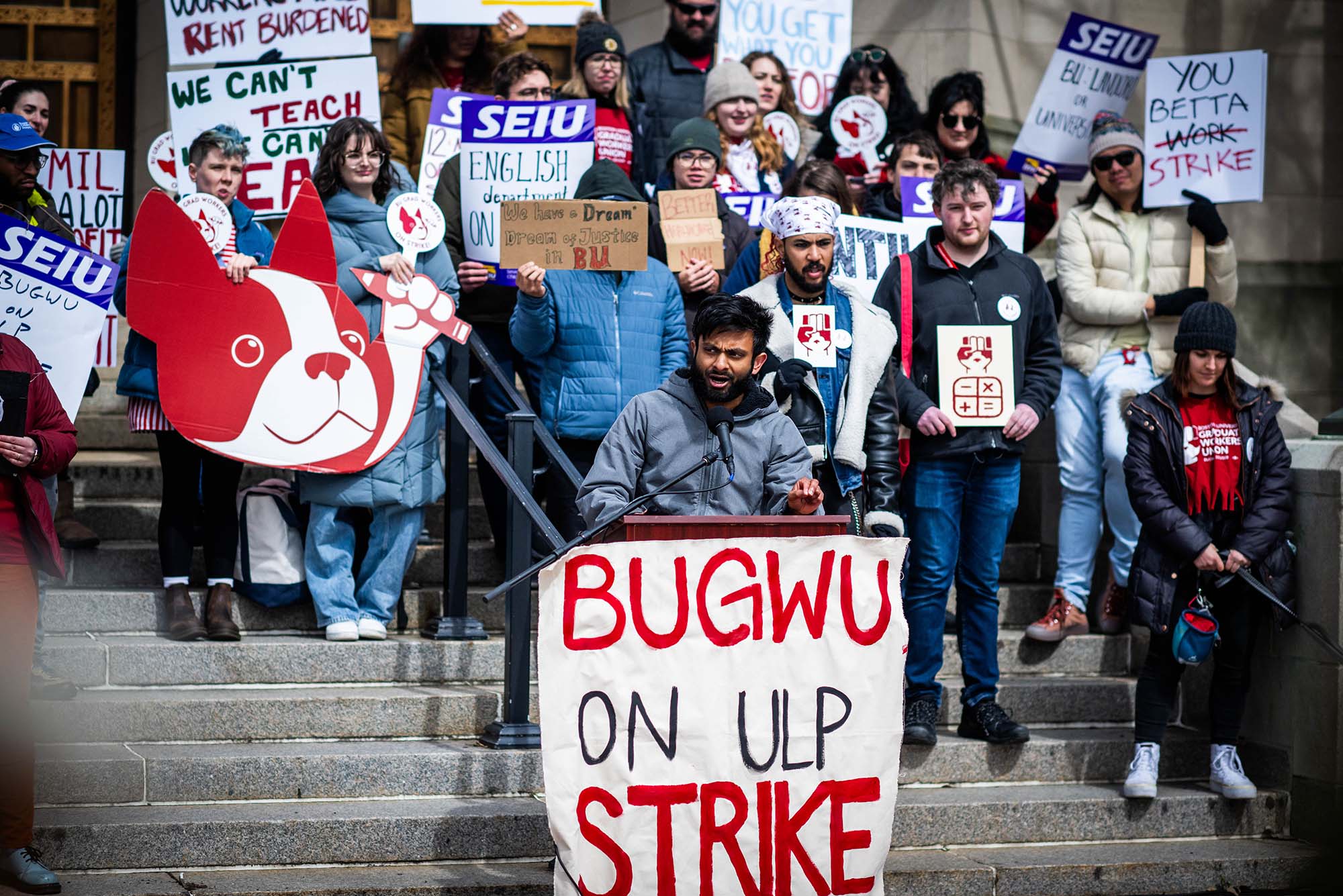BU Professors, Undergrads Adjust and Adapt as Grad Student Strike Begins
Professors map out operations for classes, labs without teaching assistants

Many undergraduates interviewed Monday were waiting to see what would happen to their lectures, lab sections, and grades in the absence of TAs.
BU Professors, Undergrads Adjust and Adapt as Grad Student Strike Begins
Professors map out operations for classes, labs without teaching assistants
Ahead of the Boston University graduate students’ strike Monday, Nathan Phillips was brainstorming workarounds for the absence of his teaching assistant (TA).
The professor of earth and environment in the College of Arts & Sciences says that his TA’s contribution is invaluable. “The teaching fellow leads on some of the actual lecture materials. They bring in their own research as it pertains to the subject material,” Phillips says. “They’re in front of the students doing teaching. They contribute directly and bring their expertise into it.”
In a course that discusses sustainability topics such as heat islands, gas leaks, and green roofs, Phillips says there is some material about which the TA is more expert. He will replace that material with topics from his own areas of knowledge. “I am in no way saying that I’m actually replacing the duties that the TA would do.” he says, “I’m delivering the content that’s true to the syllabus.”
The mood on campus Monday morning among both students and faculty ahead of the noon rally that was held at Marsh Plaza was one of anticipation and uncertainty. (This link provides students facing challenges emerging from the strike, such as discussion sections not meeting, with a contact person at each BU school and college.) Some faculty expressed nervousness about added responsibilities without their teaching assistants, while others said the lessons from the COVID pandemic had prepared them to be more flexible in their teachings. Students who spoke to BU Today were supportive of the TAs—some had received brief explainers from their TAs last week about why they were going on strike, and their demands. But undergraduates were also nervous about what would happen to their classes and grades in the absence of TAs.
During COVID, we learned we had to become flexible.
“I teach Black history and this semester, we are piloting a new class on Critical University Studies, and I also research Black working-class history, so I understand that strikes are meant to disrupt business as usual,” says Paula Austin, a College of Arts & Sciences associate professor of history and of African American and Black Diaspora studies. “We don’t know what the disruptions will feel or look like until they come, but I am not overly worried. For my undergraduate students, it is actually a really great teachable moment—to learn about BU as an institution of higher education that is also an employer with workers at different levels with different statuses, and to see organizing and activism in all its complexities and possibilities.”
In a statement released on Monday, the University said: “We value our graduate students and their many contributions to teaching and research and will continue to address their needs through the collective bargaining process. At the same time, we are concerned about the strike’s impact on teaching, research, and the lives of thousands of other students, and we are working to minimize that disruption. We remain committed to improving the lives of our graduate students through negotiations and hope that process will bring the strike to an end quickly.”
Depending on the strike’s length, the TA’s lectures could be postponed, not canceled, Phillips says. The TA also mentors them in career development and plays a key role in setting up field trips. “I am, as all faculty are, struggling with this situation,” he says.
Undergraduates who have been bracing for the strike with their professors say they are also uncertain how the strike will impact them. How long they might be without their assistants is hard to tell from recent history. Grad student strikes at Tufts, Harvard, and the University of California lasted between a few days and a few weeks; the University of Michigan’s dragged on five months.

Michael Morris (CAS’27) has two classes primarily taught by grad students and anticipates some disruptions. “I’m nervous for my [200-level computer science] class because I routinely go to office hours multiple times a week since the homework is ridiculously hard,” Morris says. “So if my TA is striking, I don’t know how I’m going to do homework [when] we get into higher-level [coding] languages.”
One College of Communication professor teaching a film and television class told her students that once the strike began, she would be taking over all discussion sections and grading—“essentially doing all of the TA’s tasks,” one of her students, Rashida Saherwala (COM’26), says. “I’m not too sure how things will run, as I do think it’s a lot for my professor to take on, especially since our class has three TAs.”
Kaili Reyes’ professor informed her economics class that he wouldn’t grade their next two homework assignments. He also eliminated a planned paper, and the midterm will subsequently carry more weight. “He will now record all lectures, which he wasn’t doing before,” says Reyes (Sargent’25). “We have a big test in two weeks, and I’m 100 percent nervous. The TA often explains the concepts better than the professor.”
It is impossible to handle these labs without TAs’ help.
Two TAs do grading and help with labs in a class taught by Chuanfei Dong, a CAS assistant professor of astronomy. “I am very worried about the disruption, especially for the lab sessions,” says Dong, who is also a College of Engineering assistant professor of electrical and computer engineering. At the moment, he doesn’t have a specific plan to weather the strike. “I don’t know if we will have replacements for teaching fellows. We have eight day labs each week, and each session has about one hour and 15 minutes. We also have one night lab on either Monday, Tuesday, or Thursday each week. It is impossible to handle these labs without TAs’ help.”
As chair of the CAS religion department as well as a professor of religion and of history, Deena Klepper says she is “very aware of the critical role graduate workers play in our courses.” Although she doesn’t have a TA this semester, “I have spoken with my undergraduate students about the strike and given them space to discuss their concerns,” she says. “They seem to be taking it in stride, and my colleagues report the same. We hear a lot of support for the graduate workers from undergraduates. They are learning about how research universities work and realizing that there is so much to BU beyond what they see from their undergrad perspective.
“In large classes with discussion sections, teaching fellows teach those sections, helping students dig deeper into content raised in lecture,” says Klepper. “In some classes, sections provide [TAs] an opportunity for instruction and feedback on major projects. They hold office hours with students, where they help with assignments, exam preparation, feedback, general academic advice, and field letter of recommendation requests, and so on. They do much of the grading for the course” and deliver some lectures.
Her department’s faculty will hold their classes as usual, Klepper says. Asked if she’s worried about instruction disruption, she says, “Strikes are by nature disruptive. That’s the point! It would be naive to think that there won’t be disruptions to instruction. The strike will affect colleagues and undergraduate students in some classes more than others, but it will affect all of us.”
Strikes are by nature disruptive. That’s the point!
Before the strike started, Kenneth Lutchen, University provost ad interim, wrote a letter to faculty, saying, in part, “We have a responsibility to continue the education of our students, and a disruption to students’ lectures, seminars, discussions sections, and labs is not acceptable.” He added that his office has offered to help BU’s various schools and colleges formulate plans “to mitigate any disruption that a strike could cause, and we depend on you to help us ensure the ongoing education of our students, especially our undergraduates.”
Phillips says the pandemic was a test drive for adjusting instruction in a moment of crisis: “During COVID, we learned we had to become flexible.”
Emily Wyrwa (COM’26) contributed reporting to this story.
Comments & Discussion
Boston University moderates comments to facilitate an informed, substantive, civil conversation. Abusive, profane, self-promotional, misleading, incoherent or off-topic comments will be rejected. Moderators are staffed during regular business hours (EST) and can only accept comments written in English. Statistics or facts must include a citation or a link to the citation.